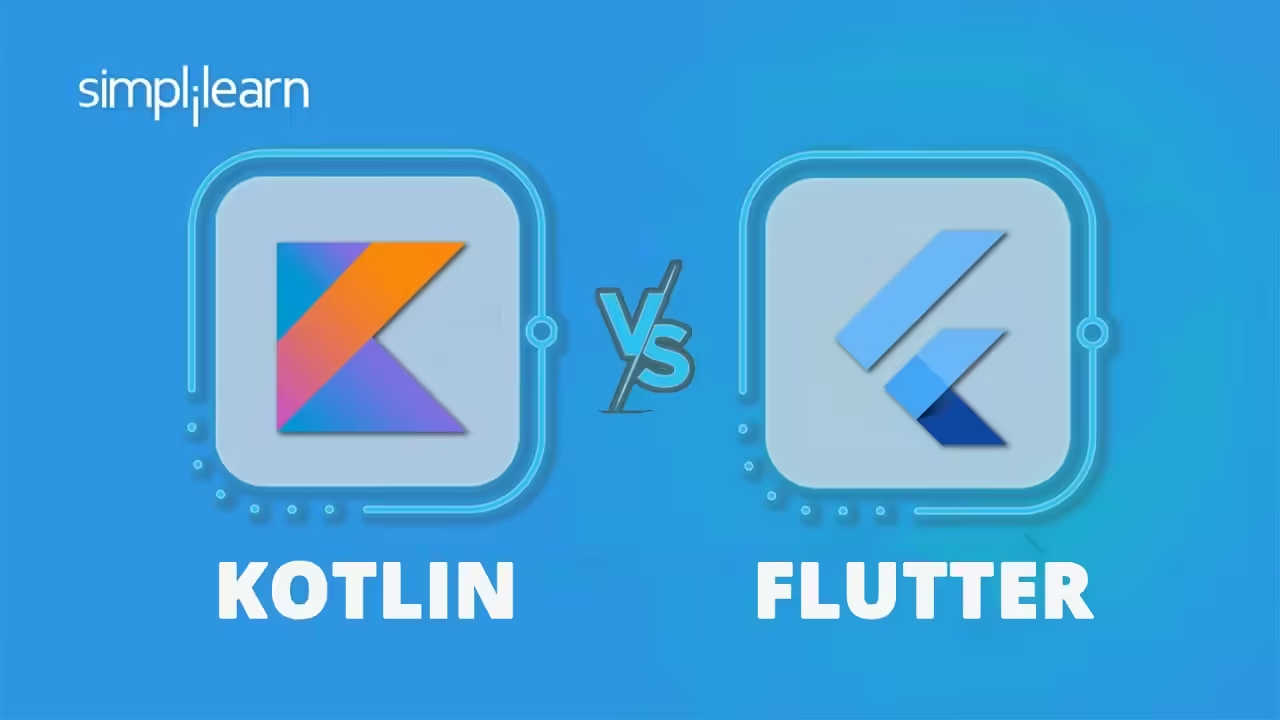Kotlin vs. Flutter | As we move deeper into 2025, the choice between Kotlin and Flutter remains a crucial decision for developers and businesses looking to build Android applications. Kotlin, a language developed by JetBrains and endorsed by Google, is the official language for Android development. Flutter, a cross-platform framework from Google, offers the flexibility of a single codebase for Android, iOS, and beyond.
In this article, we’ll explore the differences between Kotlin and Flutter, highlighting their strengths, weaknesses, and best use cases to help you choose the right option for your next project.
Introduction to Kotlin and Flutter
Both Kotlin and Flutter bring distinct advantages to the table. Here’s a quick overview of each:
- Kotlin: A modern, statically typed programming language designed for JVM and fully interoperable with Java. Its native integration with Android makes it ideal for high-performance Android applications.
- Flutter: An open-source UI software development toolkit from Google, allowing developers to build beautiful, natively compiled applications for mobile, web, and desktop from a single codebase.
Choosing between Kotlin and Flutter often depends on whether your project needs are limited to Android or require cross-platform functionality. Let’s dive into a detailed comparison.
Key Comparison Factors: Kotlin vs. Flutter
1. Performance
- Kotlin: As a native language for Android, Kotlin provides excellent performance and optimizes apps with full Android API access. With native bytecode execution, it offers seamless performance for high-demand applications.
- Flutter: Known for its high-performance capabilities as well, Flutter runs on Dart, which uses Ahead-of-Time (AOT) compilation to improve performance. While not entirely on par with native Kotlin for Android-specific optimizations, Flutter’s performance is close enough that most users won’t notice the difference. Kotlin vs. Flutter
2. Development Speed
- Kotlin: Kotlin’s syntax is concise and expressive, often requiring fewer lines of code compared to Java. The language’s rich feature set, such as coroutines for handling asynchronous tasks, further speeds up development. However, it’s limited to Android, so multi-platform needs might increase development time.
- Flutter: Flutter’s cross-platform approach is a huge time-saver for teams targeting multiple platforms. Its single codebase for Android and iOS speeds up development, maintenance, and bug-fixing efforts. Flutter’s “hot reload” feature is also a huge benefit for speeding up the development cycle, making it highly appealing for iterative projects. Kotlin vs. Flutter
3. Learning Curve
- Kotlin: Kotlin is easier to pick up for developers already familiar with Java or other statically typed languages. It’s particularly developer-friendly with a growing ecosystem, strong documentation, and active community support.
- Flutter: Flutter has a moderate learning curve, especially for those new to Dart. However, Flutter’s documentation is extensive, and it’s backed by Google’s strong support, with a wide range of tutorials and community resources available.
4. UI Capabilities
- Kotlin: Being native, Kotlin allows full customization of the UI using Android’s built-in XML layout system, giving developers control over platform-specific designs.
- Flutter: Flutter shines in the UI department, allowing developers to create visually appealing, highly customized UIs through its widget-based framework. It offers pre-made widgets and is excellent for creating visually consistent designs across platforms. Kotlin vs. Flutter
5. Cross-Platform Potential
- Kotlin: Kotlin Multiplatform is an option, but it’s still in the experimental phase and not as mature as Flutter for cross-platform use. If Android is your sole target, Kotlin is perfect, but for true cross-platform needs, it may not be ideal.
- Flutter: Flutter is designed with cross-platform in mind, making it a go-to choice for developers aiming to build for Android and iOS simultaneously. Its consistent UI across devices can reduce design and development time. Kotlin vs. Flutter
Pros and Cons of Each Framework
Kotlin
- Pros:
- Native performance and full Android API support.
- Modern language features (e.g., coroutines, extension functions).
- Strong community support and seamless integration with Android Studio.
- Cons:
- Limited cross-platform capability compared to Flutter.
- Less suited for UI-heavy, multi-platform projects.
Flutter
- Pros:
- True cross-platform capability with a single codebase for Android, iOS, and beyond.
- High-performing, customizable widgets for a rich UI experience.
- Fast development cycle with “hot reload.”
- Cons:
- Slightly less efficient for Android-specific optimizations.
- App size tends to be larger than native solutions.
- Limited access to some platform-specific features, though this gap is closing.
When to Use Kotlin vs. Flutter in 2025
Choosing Kotlin or Flutter depends on your project goals, timelines, and target audience.
- When to Use Kotlin:
- If you’re building an Android-exclusive app that needs deep integration with Android-specific APIs.
- For high-performance, complex apps, especially those that need direct interaction with device hardware or system services.
- If your team is already well-versed in Java or Android development.
- When to Use Flutter:
- For projects targeting multiple platforms, especially Android and iOS.
- For apps with a focus on beautiful, consistent UIs across devices.
- If you need faster development and plan to reach a wider audience with the same codebase.
Conclusion
In 2025, both Kotlin and Flutter continue to be popular choices for Android app development. While Kotlin is a powerhouse for Android-native apps, Flutter’s cross-platform efficiency makes it an excellent choice for multi-platform needs. Consider the scope of your project, performance requirements, and development resources when choosing the best tool for your app.

2 thoughts on “Kotlin vs. Flutter in 2025: Which is Best for Android App Development?”